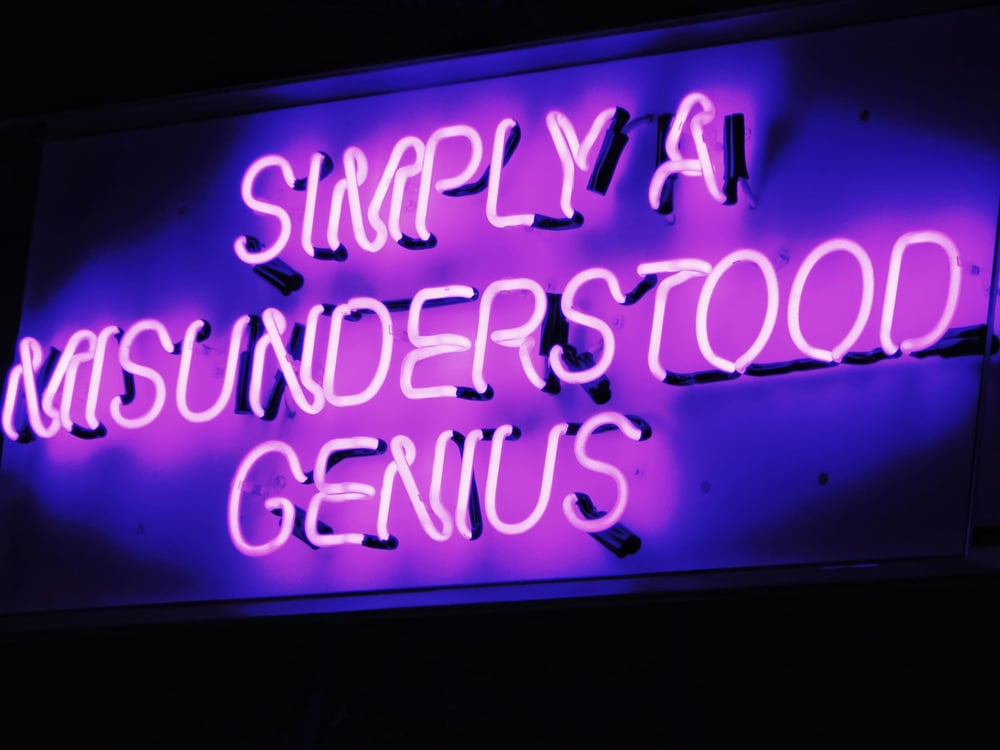How to Become a Successful Author If You’re Just Some Person

I wanted to title this article “How to Become a Successful Author When There Are 33 Million Books on Amazon.”
It was too long, but I think it reflects what most people will tell you you’re up against. The market is saturated and only the geniuses succeed, right?
And yet, you’re still here, trying to figure out how to make it happen. Which means you either know yourself to be a genius (good for you!) or you know the truth about successful authorship:
Non-prodigies succeed in this field all the time. In fact, most bestselling authors would snort at the idea that they are exceptionally gifted. What they are is passionate and committed.
I can’t promise that this article—or any article—will put a Pulitzer in your hands or even a full-time salary in your bank account. The work is tough and not everyone makes it big. But I can promise you that you’ll get a lot further than most people expect just by showing up and doing the work.
And if you genuinely love to tell stories, the work itself will be well worth the journey.
So let’s give you the best possible odds in this gorgeous, messy literary world. We’re going to take this step by step, from preparing to write a novel to marketing your novel once it’s out there.
Step One: Prepare for Greatness

The life of a successful author isn’t all dreaming up stories and typing them out. If your goal is to make a real career for yourself, you have to cultivate a mindset, a craft, and a community, too.
Here’s how to set yourself up for greatness.
Define Success
When you imagine your life as a “successful author,” what about that vision brings you joy?
Is it connecting with readers? Living a creative life? Are you in it for the money? (If so, I feel you have a right to know there are faster ways to get rich.)
If you don’t have your own definition of success, other people will give you one.
And most people don’t know the industry well enough to realize that you can make a living off of books that Barnes and Noble doesn’t carry. Or that you can supplement your royalties with other forms of income and still proudly call yourself a working writer.
Or that sometimes all we really want is to write a novel that makes someone else feel less alone.
Start Writing Immediately
You may not be ready to dive into your novel, but you need to start working on your craft right away. Write a short story about a character in your forthcoming book. Write a scene you’ve been thinking about and then look for ways to make it better. Try some writing exercises.
You master this craft by doing it. Like, a lot. So start right now.
Read a Ton
And read actively.
Choose books that are similar to the one you want to write. Note what you like and what you don’t like. Pay attention to details like tropes, story structure, and character development.
If something strikes you as brilliant, use one of your writing sessions to emulate it. Write a scene of your own in the narrator’s voice or put a character you love in your own short story. The goal of exercises like these is not to steal, but to practice applying the techniques you admire.

Do Your Research
Want to know how to be a successful author in the monetary sense?
Know. Your. Market.
Research everything. Haunt the forums frequented by fans of your genre. Know which authors are absolutely killing it and work to understand why. Learn as much as you can about your reader. What fantasies are they hoping a book will fulfill? Or are they looking to be devastated?
Finally, stay on top of industry developments. Follow podcasts and blogs that keep you up-to-date on effective marketing tactics, industry trends, and new self-publishing platforms and formats.
Study the Craft
Research shows readers prefer books that are competently written. So take time to learn your craft. The world is full of endless resources for writers, including books, YouTube videos, and the many helpful articles at DabbleU.
In fact, let’s talk about one of your greatest resources for writing education.
Build Your Community
Behind every successful author is a bunch of other authors who weren’t afraid to say, “The pacing is a little slow. Can I offer a suggestion?”
“Did you hear about this new publishing platform?”
“You get a ten-minute self-pity sob. Then I’m going to call you and I’d better hear those keys pounding.”
Start looking for your people. You can find them at writing conferences, Facebook groups, in-person writing groups, and in the forums and virtual writing groups of the Story Craft Café.
Establish a Platform
Your author platform is the online presence you create to connect with readers. This could be a website or blog, a social media presence, a YouTube channel, an email list, a podcast, a combination of a few of those, or all of the above.
Stick with platforms you’re actually going to use consistently. If you know you don’t have time to write a novel and maintain a vlogging schedule, skip the vlog.
It may seem early in the process to start building your platform, but it’s actually the perfect time. Building an audience now gives you a big boost when the time comes to publish your novel.
Prep Your Mindset
Whatever your big vision of success is, enter the writing process with a much simpler goal: to write often and write better.
These are the things you must accomplish before you can fulfill any vision of author success.
The great thing is, you can nail this goal over and over and over again throughout the writing process. This means you’re constantly piling on victories, building up your motivation, and cruising in the right direction.
So let’s get to it.
Step Two: Write Masterfully

This is the heart of how to become a successful author. You’ve got to actually write something good.
Here’s how you make that happen.
Start
How is this even a tip? It’s so obvious, right?
Well, if you’re like most writers, when starting time comes, you’ll feel a powerful pull to unload the dishwasher. You’ll remember that you meant to research what your protagonist would wear in a job like theirs. You’ll have a sudden urge to call your grandma.
Getting started is the hardest part for a lot of us because first drafts are famously crappy. And writing a crappy draft is a super effective way to stir up a thousand doubts and insecurities.
Starting is scary. It’s also the step that separates successful authors from perpetual dreamers.
Write to Market
Hopefully, you already researched your genre within an inch of its life in step one. This means you’re ready to serve your readers’ expectations in step two.
Writing to market—that is, writing fiction with the goal of giving your readers exactly what they want—is one of the most effective strategies for writing a book that sells.
Establish a Routine
Continuing to write is the second hardest step after getting started. This is why you should establish a writing routine. Write at the same time in the same place every day, whether you’re feeling inspired or not.
If you can’t write every day, that’s fine. But most writers who have limited time find it easier to maintain their momentum with daily, short writing sessions than with fewer, longer writing sessions.
Treat your writing sessions like they’re your job (that’s the goal, anyway, right?). Don’t reschedule them to make space for anything that isn’t a funeral or birth.
Set Goals and Deadlines
Whether you measure your progress by word count, page count, chapters, or time put in, give yourself goals and deadlines. This accomplishes two things.
One, it gives you a concrete reason to keep showing up.
Two, it makes this massive undertaking feel much more manageable.
Fun fact: Dabble has a cool goal-setting feature and it celebrates every time you meet an objective so you don’t forget to.

Forgive Your Humanity
You might slip up from time to time. You might miss a session or fall behind on a deadline because you overestimated your speed. You might spend three sessions in a row typing and deleting, “I don’t know what I’m doing!” over and over again.
Everyone has been there. The successful authors are the ones who forgive themselves and keep going.
Also—and this is hard—resist the urge to bail when you feel that sneaking suspicion that your draft is trash. It doesn’t matter if it’s trash. That’s why we edit.
Step Three: Edit Expertly

You already know editing is a key step to becoming a successful author. But you may not realize that editing is an opportunity to learn more about your reader, your craft, and yourself.
So try not to over-protect the ego or declare your manuscript a masterpiece after two rounds of editing. Be curious, diligent, and unafraid to break your own heart.
This book will be better for it. So will every book that comes after.
Now, let’s talk about what this editing process looks like.
Step Away
Get some distance from your work but keep hammering away at your craft while you take that distance. Start plotting your next novel, do some writing exercises, try your hand at essay writing or poetry. Do whatever you want–just keep writing.
Stepping away from your novel allows you to come back to it with fresh eyes, making it easier to notice when the story drags or if that big speech at the end of act two reads a little cheesy.
Six weeks is a good break for me. Long enough to forget exactly what I wrote but not so long that I forget how excited I am about the story. Experiment and find what works for you.
Edit Yourself
Some writers like to edit themselves as they go. Others like to complete that first hot mess of a draft so they can see the big picture before tearing it all apart. Whichever category you fall into, you’ll still have revising to do when you return to your first draft.
If you feel a little overwhelmed by how… let’s say, “not perfect” your draft is, remember that it’s supposed to be that way. You try a thing. The thing doesn’t work the way you wanted it to. So you look closer to understand why.
Self-editing is the process of becoming a better writer.
Seek Feedback
Once you’ve done all you know to do to improve your novel, show it to someone else. Preferably several someone elses. This includes other writers, your mentor, professional editors, sensitivity readers, and beta readers who love your genre.
If you want to know how to become a successful author, you have to know how to be open to feedback. You don’t have to take every suggestion that comes your way, but you do have to be eager to learn.
Polish
Take all that helpful feedback and make your novel shine. Start with high-level issues, like reworking the climax or tracking your protagonist’s motivation more clearly.
Then you can dig into the nitty-gritty, like perfecting your dialogue or making sure your prose isn’t rife with excessive adjectives.
Once your style is as solid as your story structure and character development, you’re ready to put your work out there.
Step Four: Publish Strategically

If your goal is to become a commercially successful author, your approach to publishing and marketing is almost as important as your skills as a writer.
It might be exactly as important, but I refuse to say so because to say anything matters as much as the craft is to surrender my writerly soul. Just know that the business nonsense is crucial, and you should approach it with an actual strategy.
That strategy will vary depending on whether you plan to publish traditionally or self-publish.
Traditional Publishing
Traditionally published books are books that have been produced, distributed, and marketed by a publishing company, not by the author.
If this is what you want to do, your first order of business is to query agents. This means you reach out to literary agents who represent work like yours. Hopefully, you find a good fit, and that agent then shops your novel around to publishers.
Here are a few quick tips for nailing the query process:
- Research agents to find the best match for you. While it may seem efficient to blindly send a billion queries to a billion agents and see who bites, your odds of success are much higher when you can pitch your book as the perfect fit for specific agents.
- Workshop the living daylights out of your query letter. Query Shark is a great resource for this.
- Follow guidelines to the letter. If an agent responds with a request to see a one-page synopsis, send them exactly that.
Once you’ve found your agent, keep those business pants on. There’s more work to do. But we’ll get to that in a moment.
Self-Publishing
Most—if not all—of the books you see in a bookstore are traditionally published. For this reason, a lot of people assume self-publishing doesn’t belong on a guide for how to become a successful author.
But in fact, there are six-figure self-published authors. There are also seven-figure self-published authors. There are self-published authors who left traditional publishing because they saw greater potential for success by doing it all themselves.
Of course, that doesn’t mean self-publishing is a guaranteed path to success. You have to choose the option that’s right for you. Self-publishing allows you to make much higher royalties, but it also comes with unique challenges.
Most notably, you have to find readers and create a professional-looking product without the support of a big publisher. To accomplish those things:
- Hire a professional editor (or editors)
- Invest in quality cover design
- Keep building that author platform
- Invest in paid advertising
- Price your book effectively
- Create a launch plan that incorporates all of the above
Then do all the other things listed in this next section.
How to Become a Successful Author However You Publish
Even if you work with a big publisher who has a powerhouse marketing team, you can’t assume your publisher will invest those resources on your book. Whether you’re traditional or indie, your success depends on your own effort to connect with readers.
Here are some smart steps you can take both before and after your book comes out:
- Keep marketing. If you’re self-published, this may include paid advertising. For both self-published and traditional authors, marketing also includes things like email newsletters, social media engagement, podcast appearances, and more.
- Ask for reviews.
- Find ways to build and maintain reader relationships. Respond to social media comments, keep up your blog, set up readings and book signings, etc. It’s not just about selling books now. It’s about being on readers’ radar when your next book comes out.
- Pay attention to feedback. What do readers love (or not love) about your book? What are you learning that you can apply to the next book?
- Note any new discoveries about the business itself. What marketing efforts are the most successful? Have you become aware of new trends or opportunities you can tap into next time?
You may have noticed that many of these tips are as much about the next book as they are about the one you’re selling now. This brings me to the next phase of your author success strategy.
Step Five: Write Another Book

Then another. And another.
Very few authors make it big from their first book. (To get a sense of the actual numbers you might expect to see as a first-time author, check out this article.)
If I were to sum up how to become a successful author in a single sentence, it would be this:
Keep going.
Keep writing, editing, learning, evolving, publishing, marketing, and starting new projects.
This diligence is the true indicator of success, more so than inherent genius. You don’t have to be a prodigy. You just have to show up.
And at Dabble, our goal is to make showing up as easy as possible.The Dabble writing tool is designed to keep you on track with Character Notes, Story Notes, and Scene Cards all on hand as you draft your novel.
Try these and all other Premium Features free for fourteen days by clicking this link.









